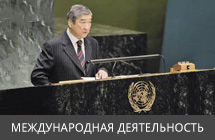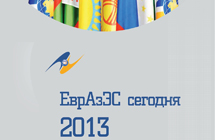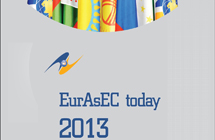|
CONCEPT of Concerted Social Policy of Member States of Eurasian Economic Community Approved by Resolution of the EurAsEC Interstate Council 18 April 2007, No. 335
CONCEPT of Concerted Social Policy of Member States of Eurasian Economic Community
The institution of the Eurasian Economic Community (hereinafter referred to as EurAsEC or the Community) created the political basis for development of a concerted social policy. The Treaty on the Establishment of the Eurasian Economic Community of 10 October 2000 establishes that EurAsEC is created in pursuance of the achievement of the objects and purposes set out in the agreements on customs union of 6th and 20th January 1999, the Treaty on increased integration in the economic and humanitarian fields of 29 March 1996, and the Treaty on a customs union and a common economic space of 26 February 1999. Pursuant to the Treaty on increased Integration in the economic and humanitarian fields EurAsEC member states (hereinafter referred to as the Parties) shall conduct a concerted social policy, converging, harmonizing and unifying the national legal codes in the socio-humanitarian area. In April 1998 the heads of the states signed a joint Declaration “On Ten Simple Steps towards Ordinary People,” with the goal of giving the integrationist processes at work a qualitatively new additional impetus. The Declaration emphasizes that the measures proposed in the Declaration compose an integrated whole, and that implementation of the measures shall promote improvement of the living standards and bring the nations closer together. Analysis of the implementation of the Declaration leads one to believe that the goals set in this document are being successfully met. The interstate and intergovernmental acts that were adopted and are now being implemented are aimed at: simplification of procedures for citizenship acquisition and border crossing; creation of equal opportunities for access to medical care; unobstructed circulation of currencies and movement of luggage; facilitation of procedures for money and mail transfer; provision of unobstructed subscription to publications and delivery thereof across the borders; creation of favorable conditions for dissemination of radio and television broadcasts across the borders; mutual recognition of academic degrees; creation of an environment favorable for small and medium businesses. The adopted statutory regulations are based on the generally accepted norms and principles of international law governing social policy and conform to the main provisions of the international documents adopted by the UN and ILO, and of the Eurasian Social Charter endorsed by the Antiparliamentary Assembly of EurAsEC.
I. GENERAL PART
The transition to market relations in EurAsEC states has entailed aggravation of existing social and economic problems and an increase in new problems that originated either in the period prior to the reforms, or in the macroeconomic policy and strategy selected for market reforms. With respect to social and labor issues, the following remain the most serious problems: inequitable income distribution; weakened motivation for work and unemployment; flaws in the system of social protection; relatively high level of poverty; worsening of the demographic situation across the Community; growth of unregulated labor migration. Since the above problems are being addressed by nations with different levels of social and economic development and different patterns of social policy, the process of social integration has to be time-phased. The Concept of concerted social policy of EurAsEC member states (hereinafter referred to as the Concept) is designed to coordinate the Parties’ socio-humanitarian projects and programs, and to use integration opportunities more efficiently to promote development. The Concept was developed in accordance with the Priority Directions of Development of EurAsEC for 2003-2006 and subsequent years, and the Measures for Implementation of the Directions approved by the Resolution of the Interstate Council of EurAsEC (at the level of heads of state) on 9 February, 2004, No.152, with respect to the development of cooperation in the socio-humanitarian area and in the area of immigration policy. The Concept is a complex of shared goals, principles and priorities in social development, mutually agreed by the Parties in a situation of increasing connections between the states; it sets out directions, phases and mechanisms for implementation. The Concept reflects the Parties’ commitment to create a complex mechanism for the protection of social rights of the population of EurAsEC member states, which would combine economic, political, legal and administrative instruments and help minimize violations of human rights. Coordination of social policy and the strengthening and development of cooperation within the Community will help to accelerate fulfillment of current and forthcoming goals in the socio-humanitarian area, and to raise the living standards of the Parties’ population.
II. MAIN OBJECTIVES AND PURPOSES OF CONCERTED SOCIAL POLICY
The main objectives of the concerted social policy are to solve urgent socio-economic problems and expand opportunities for human development through coordination of strategic directions of the Parties’ social development, through creation of a methodological basis for strengthening cooperation and increasing integration in the socio-humanitarian area, through monitoring progress in the pursuit of a social policy, and through forecasting of the consequences of the social reforms. Introducing a social dimension to the economy, social development shall be viewed as interconnected with the general economic development of the Parties and the restructuring of the economy. Increased social integration and social convergence within the Community shall be realized through transition to higher social standards comparable to those of the most advanced nations, through the use of social institutions functioning in the world community, and also taking due account of the state policy experience of welfare states. It appears that the best approach to shaping the concerted social policy of the Parties would be to realize the principle of flexible integration, which consists of determining strategic goals, social standards and indicators, and determining levels for the gradual shaping of the Community’s social policy. Herewith, every Party can determine its action plan for achievement of the common goals, based on its national interests and financial/economic resources. The process of social integration, therefore, shall address the following most urgent challenges: – provision of a fitting level and quality of life for the population; – overcoming poverty; – promotion of productive employment; – strengthening of social protection and support for the most vulnerable population groups; – utilization of opportunities for the institutions of civil society and the strengthening of social responsibility of business. The ultimate purpose of implementation of the Concept shall be the creation of a community of welfare states by means of accelerated socio-economic development and the integration of EurAsEC states on a legal basis, in compliance with the constitutions of the Parties.
III. MAIN PRINCIPLES, DIRECTIONS AND STAGES OF CONCERTED SOCIAL POLICY
1. The concerted social policy of the Parties shall be based on the following principles: – citizens of every member state of the Community have the right to a decent life; – personal economic freedom, a person's right to free choice of any type of activity; – equal opportunities and prohibition of discrimination in work and employment; – abolition of all forms of forced or compulsory labor; – social, economic, legal protection and support of women, families, children, the young, the elderly, invalids and other socially vulnerable groups of the population; – citizens have equal rights to education; – secondary education and basic vocational training available and free of charge; mid-level vocational training and graduate or post-graduate professional educational free of charge and available on a competitive basis; – availability of quality medical care; – availability of housing and public utilities; – social justice and social solidarity; – participation of citizens in state administration and public affairs, and development of social partnership; – freedom of association, meaning that citizens may form ethnic, interethnic and international organizations for the purposes of protecting their economic and social interests. The said principles shall be realized by means of effective development, the use of human potential and economic resources, and application of market mechanisms for economic regulation. The optimal linking of the Parties’ national interests and the interests of the Community as a whole during the period when common principles of social integration are being established shall make the process sustainable in an objectively volatile socio-economic environment. in the social and labor area: creation of a single methodology for legal regulation of labor relations; preparation, on the basis of concerted principles and lines of approach, of model laws regulating labor protection; elaboration and implementation of concerted state policy with respect to work compensation; unified lines of approach to the formation of social security systems; creation of a common labor market in the Community; in the area of education creation of a mutually acceptable concerted system of training and retraining teachers and instructors for EurAsEC states; enhancement of the effectiveness of informational and consulting support for educational systems, including the provision of educational and consulting literature; development of modern forms of education (including distance learning) on the basis of advanced information and communication technologies; expansion of academic mobility and export of educational services; creation of a single educational space within the Community; in healthcare conduct of a concerted policy in the areas of healthcare, provision of medicines, and sanitary and epidemiological safety of population; optimization of the use of academic, technical, labor and financial resources used to improve the quality of medical services; formation of a wholesome way of life and awareness-raising among the population with respect to healthcare and hygiene; development and deepening of cooperation in the area of training, retraining and advanced training for healthcare and pharmaceutical industry workers; creation of a permanent interstate informational system; in the area of health enhancement and increased life expectancy of the population increase of average life expectancy; reduction of early infancy and child mortality rates; improvement of reproductive health; improvement in the quality of medical rehabilitation for invalids; efficient monitoring of the quality of produced and consumed food and non-food products, as well as services provided; development and greater cooperation in the provision of medicines to the population; in the area of demography creation of socio-economic conditions for the solution of demographic problems and strengthening the family as an institution; creation of favorable conditions to give young people a good start in life and promote self-realization by increasing the availability of school-level and professional education, first employment and housing; in the area of culture and athletics strengthening coordination in the area of culture and athletics; creation of socio-economic conditions for the development of creative activities among the population, physical culture and athletics for the masses, promotion of sponsorship and patronage of the arts; provision of a single space of interethnic and interstate contacts in culture and athletics; in the area of population migration strengthening coordination in the area of migration regulation; improvement of the efficiency of concerted state policy in the area of migration by achieving conformity between the size, directions and structure of migration flows and the interests of migrants and societies in receipt of migrants; promotion of the integration of migrants into the society and promotion of tolerance towards migrants. 3. Considering the Priority Directions of Development of EurAsEC and the relatively uneven socio-economic development of different states within the Community, as well as the states’ national specifics, the transition to a concerted social policy shall be accomplished in steps. Priority directions of the concerted social policy shall include: creation of a single methodology of the legal regulation of labor relations and unified lines of approach to the setting up of social security systems; creation of a concerted migration policy; creation of a concerted system of training and retraining teachers and instructors for EurAsEC states; social prevention of drug addiction, alcoholism, HIV/AIDS infections and other socially dangerous diseases; social support of women, children, the young, the elderly, invalids and families. It is expected that in the future, while preserving and implementing the listed priority measures, cooperation in socio-humanitarian areas will be expanded and increased along the lines described in the present Concept.
IV. MECHANISMS OF REALISATION OF CONCERTED SOCIAL POLICY
The elaboration and gradual accomplishment of a range of measures are planned in pursuance of implementation of the Parties’ concerted social policy. 1. Harmonization and unification of legislation Creation of a community of welfare states presupposes concurrent formation of a common legal space. Within EurAsEC social rights shall be secured in the form of main directions of concerted social policy codified at the interstate and intrastate (national) levels. For this purpose it is advisable, as a first step, to analyze the national laws governing social relations in the areas of labor, employment and social protection of the population, education, healthcare, labor migration etc. In pursuance of convergence (harmonization, unification) of the legal codes in socio-humanitarian areas, the Parties shall coordinate their efforts to develop and improve legislative acts and other legal instruments, including: drafts of international treaties; Fundamentals of Legislation of EurAsEC; model laws; recommendations for convergence (harmonization, unification) of legal codes; proposals for improvement of legislation. It is expected that gradual improvement and convergence (harmonization, unification) of the legal codes in the area of social policy shall be accomplished by transition to more challenging goals, requirements and progressive norms with due account taken of the experience of developed nations. 2. Setting up a system of social guarantees and indicators The most important elements of the mechanisms of social policy are social guarantees from the state that ensure realization of the citizens’ social rights as determined in the constitutions of the Parties and also serve as reference points in pursuit of the objectives of the social and economic policy of a welfare state. In relation to this, it is expected that in the future a system of social development standards and indicators shall be created in EurAsEC member states, including minimal social guarantees from the state which would embrace the following areas of social relations: work and employment; social protection; education and professional training; healthcare and provision of medicines; provision of housing, utilities and consumer services for the population; science and culture; ecological safety. 3. Social partnership Social partnership is one of the efficient mechanisms of civil society in a democratic nation. If, in addition to the state, representative organizations of employers and employees can be involved in social dialogue, this will facilitate coordination of the Parties’ social policies and promote social stability and social consensus. 4. Social responsibility An indispensable condition of the efficient functioning of a welfare state and the implementation of a concerted social policy in the Community is the development and operation of a mechanism for the social responsibility of state power and administration at every level, of every business and every individual. The key means of implementing the social function of the states within the Eurasian Economic Community – a function declared in their constitutions – would be to use flexible economic policies and try to establish equilibrium between economic freedom and realization of the social function. 5. Institutional development Institutional development and academic research, as a necessary condition for implementing a concerted social policy providing maximum utilization of the latest institutional research and cutting-edge achievements in science and technology, should promote the realization of this policy’s main principles and become a means to reduce social tension in the Community states. 6. Financing Steady and sufficient financing is the most important factor and condition for realization of a concerted social policy in EurAsEC. The regulation of social financing is based on the criterion of a general increase in economic resources funneled into social programs and optimization of the share of these resources in the GDP and budget expenditures. Together with the state, commercial and non-commercial institutions and organizations and physical persons may contribute to the financing of the social sphere. Elaboration and realization of interstate target-oriented programs and projects in the socio-humanitarian sphere can be financed from the Community’s budget, the budgets of EurAsEC member states (from funds appropriated for these purposes) and extra-budgetary sources. 7. Monitoring and control Monitoring and efficient control of adherence to and implementation of adopted international documents, standards and requirements in the social sphere is an indispensable condition of a concerted social policy. Thus the mechanism for realization of the Concept presupposes the development and step-by-step implementation of measures to create legal, financial and economic, institutional, organizational and methodological conditions for the creation of a community of welfare states.
V. ANTICIPATED RESULTS OF IMPLEMENTATION OF CONCERTED SOCIAL POLICY
Successful implementation of the concerted social policy by the Parties, based on the coordination of strategic directions in social development and increased integration in the socio-humanitarian sphere, should facilitate the formation of a community of welfare states that will ensure realization of the social rights for citizens of EurAsEC states guaranteed in the states’ constitutions, expand the opportunities for human development and promote improvement of living standards for the entire population of EurAsEC. The main accomplishment of the new community shall be the creation of a single social space, including: unobstructed migration of citizens and the functioning of a common labor market; use of a system of concerted social standards and indicators; development and coordination of a system of social security; retirement security for the citizens based on concerted principles and lines of approach; use of a common educational space; availability of an entire range of quality medical services and medicines; creation of a favorable living environment; a single space for interstate and interethnic cultural contacts; functioning of a common legal space.
VI. FINAL PROVISIONS
Coordination of efforts to accomplish the Concept shall be implemented by the Integration Committee of EurAsEC in collaboration with the Interparliamentary Assembly of EurAsEC and the Parties’ state organs and non-governmental organizations. Amendments agreed by the Parties may be introduced to the Concept. __________
|






Поиск 10.10.2014 Заседание Межгосударственного совета ЕврАзЭС07.10.2014 Мультимедийная пресс-конференция в агентстве «Россия сегодня»03.10.2014 Встреча с Послом Финляндской Республики04.08.2014 Встреча Генерального секретаря ЕврАзЭС с Послом Республики Таджикистан20.06.2014 Премии Петербургского международного юридического форума «За вклад в развитие правовой интеграции на евразийском пространстве»28.05.2014 Договор о Евразийском экономическом союзе – важнейшее событие в новейшей истории наших стран25.05.2014 Презентация книги «Евразийский проект Нурсултана Назарбаева, воплощенный в жизнь. К 20-летию евразийского проекта 1994–2014»24.05.2014 VII АСТАНИНСКИЙ ЭКОНОМИЧЕСКИЙ ФОРУМ. Панельная сессия «Евразийской экономической интеграции – 20 лет. Итоги и перспективы»24.05.2014 VII Астанинский экономический форум и II Всемирная Антикризисная конференция, 21-23 мая 2014 года, Астана24.05.2014 Петербургский международный экономический форум, 23 – 24 мая 2014 года, Санкт-Петербург |

Евразийское экономическое сообщество
ЕврАзЭС
-
Страны участники
 Беларусь
Беларусь
-
 Казахстан
Казахстан
-
 Кыргызстан
Кыргызстан
-
 Россия
Россия
-
 Таджикистан
Таджикистан
-
 Узбекистан
Узбекистан
-
 Молдова
Молдова
-
 Украина
Украина







